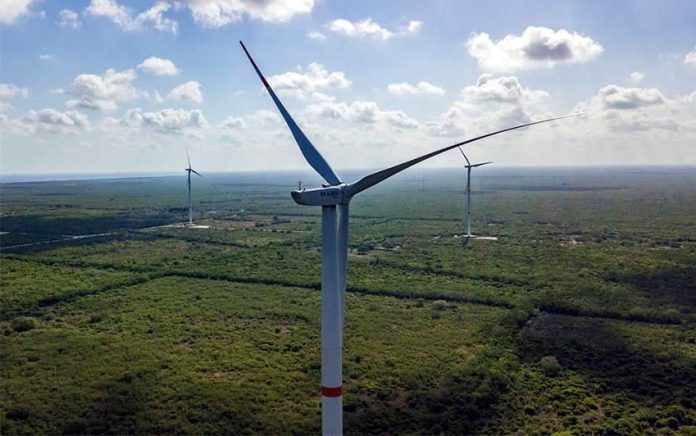They generate almost half of Mexico’s power at much lower prices than the Federal Electricity Commission (CFE) but private energy companies have still incurred the wrath of President López Obrador.
The president on Wednesday claimed that private companies, including those that generate clean, renewable energy from sources such as wind and solar, have provided “nothing” to the national electricity system.
His claim, however, is far from the truth. Private energy companies generate 46% of the nation’s electricity, according to the Energy Regulatory Commission (CRE), and they do so at a cost up to 85% less than the CFE.
Although renewable projects are capable of generating energy that is both cheaper and cleaner than that generated by the commission, the National Energy Control Center (Cenace), a supposedly independent federal entity, has taken the decision to limit temporarily the amount of electricity existing wind and solar projects can supply to the national grid.
The center also published measures last week that suspend national grid trials for new renewable projects, a move that will delay the start of at least 28 wind and solar farms. The generation of electricity at old, inefficient CFE plants will instead be ramped up “to improve the reliability of the electricity system” during the coronavirus crisis, Cenace said.
López Obrador claimed that the Cenace measures represent a “fair deal” for the CFE because when it buys energy from private companies, it incurs a loss.
But the state-run company will incur an even bigger loss by generating greater quantities of electricity itself. According to the CRE, the average cost of generating a megawatt hour (MWh) of electricity at CFE plants is US $141.21.
In contrast, the CFE has one agreement to buy electricity from private companies for $20.57 per MWh – 85% less than its own generation cost – and two others in which it pays $33.40 and $47.70.
Inder Rivera, manager of clean energy at the World Resources Institute in Mexico, said that being able to purchase power from private companies is actually a blessing for the CFE, not a curse as López Obrador suggests.
Víctor Ramírez, spokesman for the Mexico Climate and Energy Platform, a renewable energy advocacy group, agrees that there is an inherent contradiction in the president’s discourse.
“He says that this measure [ramping up production at CFE plants] is to maintain or lower rates but … the more CFE-generated energy is used, the more energy will cost,” he said.
Therefore, Ramírez added, the government will either have to further subsidize rates to maintain them as they are, or take the unpopular decision to increase them.
For his part, the director of the Mexican Wind Energy Association said that the suspension of trials that allowed wind farms and solar parks to provide electricity for the national grid poses a threat to investment in renewable projects.
Julio Valle claimed that the coronavirus crisis is being used as an excuse to deliberately stall the commencement of new renewable energy projects that are ready or almost ready to inject environmentally-friendly power into the grid. Seventeen such projects were scheduled to come on line this year while another 11 were slated to begin operating in 2021.
However, the Cenace decision will cause delays to all 28 projects because they cannot begin supplying energy to the national grid if they have not completed the compulsory trials to ensure that their systems are compatible with those of the CFE.
“After finishing construction, it is necessary to verify that the generation system is compatible with the [CFE] system, that it operates in the conditions that the electrical system demands,” said Ramírez.
“What they are doing is blocking these tests prior to entry into operation, and therefore all these plants cannot go into operation,” he said.
Located in Yucatán, Campeche, Tamaulipas and Chihuahua, among other states, the 28 wind and solar projects will have a generation capacity of more than 4 gigawatts, or 4 billion watts, and represent investment of US $5-$6 billion. Investors will now be forced to wait longer than expected to begin recouping their outlays.
Ana Lilia Moreno, a senior researcher at public policy think tank México Evalúa, charged that the Cenace measures locking renewable projects out of the national grid, at least temporarily, are in violation of competition regulations.
“It is a clear confrontation with the private sector to put a brake on them, even on investments that have already been completed. The Federal Competition Commission would have to review the competition conditions that are being violated with this agreement,” she said.
Greenpeace México said in a statement that the Cenace measures represent “an obstacle and a threat to an already insufficient climate policy” and to the attainment of Mexico’s commitments to reduce greenhouse emissions in accordance with the Paris Agreement.
The environmental organization said that the measures stop the operation of new renewable projects “without technical or legal justification.”
“Renewable energy, far from putting the national electricity system at risk, can build a more resilient, fair and accessible system. In a country where more than 30% of households suffer from some form of energy poverty, it is clear that the electricity system based on centralized fossil-fuel projects has not been effective in creating [equitable] access,” Greenpeace said.
“In addition to contributing to the achievement of Mexico’s climate goals, renewable energy combats energy poverty, creates jobs, and promotes savings and efficiency in the consumption of energy.”
But the president has other goals and saving Pemex is one of them. The company has fuel it cannot sell elsewhere and the CFE is a willing buyer.
